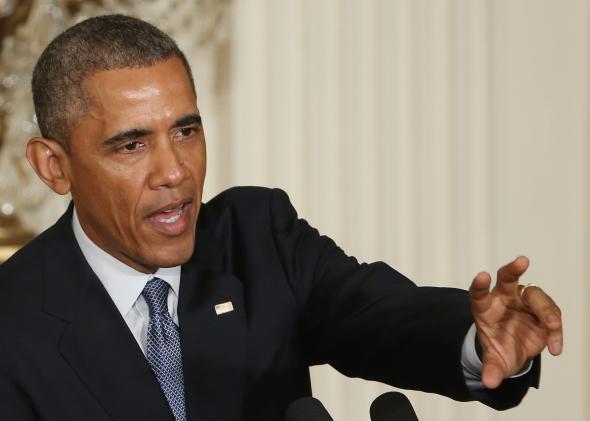Last week, British Prime Minister David Cameron incensed the Internet by proposing to ban secure messaging applications, like WhatsApp and Snapchat, unless they install backdoors to allow government spying. Plenty of other services, including Apple’s iMessage and FaceTime, might also run afoul of such a law, the Independent pointed out.
Cameron’s call for mandatory backdoors offended online privacy advocates, but it couldn’t have shocked them. This is the same leader who ignored censorship cries and installed porn filters on the country’s Internet services, with some rather predictable unintended consequences.
In a press conference with Cameron on Friday, however, President Obama agreed with his British counterpart that the absence of backdoors is “a problem.” As reported by The Hill, he said:
Social media and the Internet is the primary way in which these terrorist organizations are communicating. That’s not different from anybody else, but they’re good at it. And when we have the ability to track that in a way that is legal, conforms with due process, rule of law and presents oversight, then that’s a capability that we have to preserve.
More specifically, he added, according to the Wall Street Journal:
If we find evidence of a terrorist plot … and despite having a phone number, despite having a social media address or email address, we can’t penetrate that, that’s a problem.
Obama stopped short of joining Cameron in an explicit call for legislation that would ban services that don’t build in a way for the government to spy on their users. Instead he said:
The laws that might have been designed for the traditional wiretap have to be updated. How we do that needs to be debated both here in the United States and in the U.K.
On its face, it’s not absurd that the government should have a way to intercept electronic communications in rare cases to stop suspected terrorists. As the Economist points out in an editorial supporting backdoors, “every previous form of communication—from the conversation to the letter to the phone—has been open to some form of eavesdropping.”
On the other hand, privacy and security experts argue that backdoors are bound to be exploited for nefarious purposes. That could happen through government abuse of its surveillance powers. Or the backdoors might inadvertently make it easier for nongovernment hackers to compromise people’s privacy. “There’s no back door that only lets good guys go through it,” Boing Boing’s Cory Doctorow argues. As Brian Duggan explained in Slate in 2013:
Creating a back door in software is like creating a lock to which multiple people hold the keys. The more people who have a key, the higher the likelihood that one will get lost.
Legislation like what Cameron has proposed would undermine encryption at just the time when the tech industry is beginning to embrace it. In September, Apple and Google announced plans to strengthen encryption of data stored on smartphones that use their operating systems. The move was cheered by a public shaken by the recent iCloud celebrity photo hack. But it was harshly criticized by FBI director James Comey. Now, in the wake of the Charlie Hebdo attack in Paris, it seems Obama is in Comey’s camp.
The president says he understands the need to balance security with privacy. The problem is that, as we’ve seen with the Snowden leaks, the government officials, intelligence officers, and contractors entrusted with finding that balance tend to be far more concerned with one than the other.
Previously in Slate:
